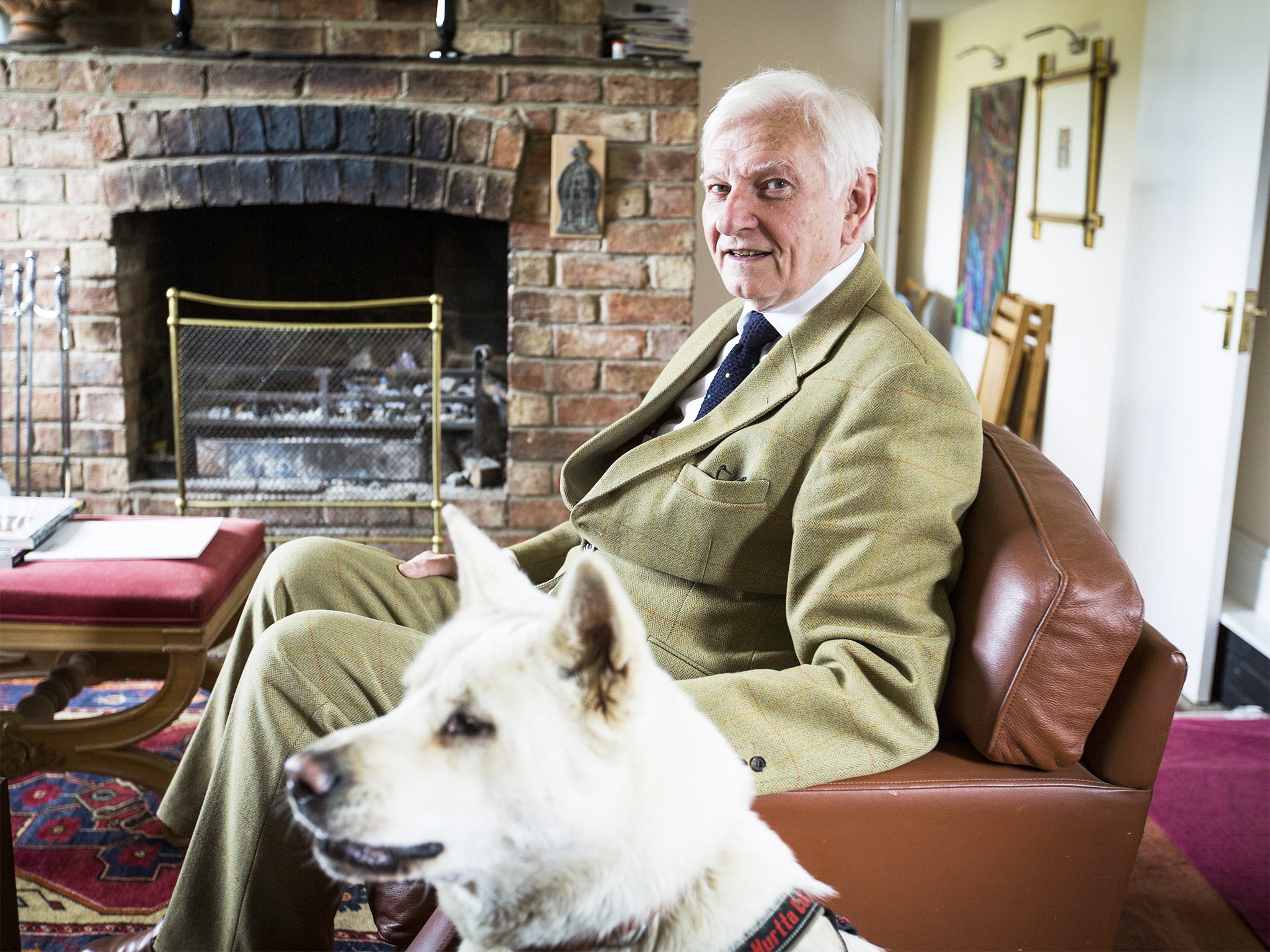Former Tory MP Harvey Proctor: I was about to kill myself, but an act of kindness saved my life
A dinner invitation from an old colleague on the night before he was due to appear at Bow Street Magistrates' Court stopped Proctor from taking an overdose

Your support helps us to tell the story
From reproductive rights to climate change to Big Tech, The Independent is on the ground when the story is developing. Whether it's investigating the financials of Elon Musk's pro-Trump PAC or producing our latest documentary, 'The A Word', which shines a light on the American women fighting for reproductive rights, we know how important it is to parse out the facts from the messaging.
At such a critical moment in US history, we need reporters on the ground. Your donation allows us to keep sending journalists to speak to both sides of the story.
The Independent is trusted by Americans across the entire political spectrum. And unlike many other quality news outlets, we choose not to lock Americans out of our reporting and analysis with paywalls. We believe quality journalism should be available to everyone, paid for by those who can afford it.
Your support makes all the difference.To say Harvey Proctor divides people doesn’t begin to do the job. As a member of the Monday Club in the 1960s, 70s and 80s, he espoused views fashionable only on the right of the Conservative Party (which he insists were prescient, the migration horse having bolted long ago, he says).
As a dutiful Essex MP, first in Basildon from 1979-83 and then Billericay from 1983-87, he helped to provide the ballast on Mrs Thatcher’s back benches. But the red-top press got wind of his sexual preferences and he decided not to run again in the 1987 election.
It was bad enough that he was (pass the smelling salts) a homosexual, which no MP at the time dared admit. More seriously, he had been breaking the law by paying for “the company”, as he puts it, of rent boys, who were not above telling their story to, particularly, the left-of-centre popular papers.
Proctor thus became something of a pantomime baddie in parts of the media.
He was on the front page of one or other Sunday paper six weeks on the trot. Ridicule and scorn were heaped on him as details emerged of spanking sessions, elaborate role-playing and trouserless friends being locked out of his house.
The demise of a man who apparently saw human flesh as just another tradable commodity delighted ideological opponents and embarrassed Tory colleagues, politically at least. In the intervening years he has re-emerged only occasionally, including a 12-year, but ultimately unsuccessful, venture into retail, selling shirts.
So what is the seismic event that has made him agree to this interview, at his home on the Duke of Rutland’s estate?
Answer: the fact that his appetite for the company of vigorous young men 28 years ago has led to him being accused of being not only a paedophile but a murderer, effectively the hub of the supposed Westminster sex ring.
It is an understandable error only if all transgression with those under the legal age of consent are considered equally, and if you consider that the name of Terry Dwyer, who had introduced Proctor to one of the young men in question, also appears on documents supposedly linking him to the Elm Guest House in Barnes, where extensive abuse has been alleged.
Proctor says emphatically that he had never heard of the guest house until recently and that Dwyer, now dead, tried unsuccessfully to blackmail him. (He showed no sign of knowing any of the other dramatis personae in the Barnes story.) Further, he points out that one boy who was 19 had lied to him about his age (the lie was on the tape of his Fleet Street accusers).
He also says that until he spoke to his solicitor, Sir David Napley, he did not believe he had committed a crime. Napley told him that there was an anomaly in the law, namely that if a heterosexual has been misled into believing their partner is over the age of consent, that can be used a defence, but the same did not apply to homosexuals. At that point, Proctor decided to plead guilty.
Those convicted of the offences in question can apply to have them set aside, as there was at the time a further anomaly, between the gay and heterosexual age of consent. For the record, he says he has never been involved with anyone under 16 and has only ever been involved in consensual acts. He seems rather shocked at any suggestion otherwise.
Among the documents seized by police in their raid in March is a psychiatrist’s report from 1987 confirming he did not believe Proctor to be a paedophile. He is anxious to have it and other documents returned so he can start writing a book.
On Sunday, he wrote a furious “put up or shut up” article in our sister paper the Independent on Sunday, accusing the police of hanging him out to dry and of having raided his home without good reason.
“In the last 28 years I have tried to build up my life again and in 15 hours they have crashed all that I have down again,” he told the paper. I asked if he ever considered simply “coming out” during his political prime. “I wouldn’t have been selected as a candidate in 1978 and in the late 1980s it was still very, very rare. Even (Times columnist and the first Tory MP to come out) Matthew Parris and I never talked about it.”
He had never discussed his sexuality with his mother, although he thinks she hardly needed telling. Attitudes to homosexuality have changed, he agrees, but he asks why there are so few openly gay sports people and FTSE 100 chief executives, for example. “Are there any gay editors?” he asks.
At the time he still believed he had a defence, he denounced much of the press coverage as lies. Yet he was later convicted, allowing his accusers to believe he had been less than candid.
Does he not regret that? He says that virtually every article about him was inaccurate, and he did not see it as his job to unpick the right from the wrong. Conservative central office told him not to provoke a by-election in Billericay by resigning, as they would be bound to lose it, so his torment continued. Should he have played it differently?
“I have thought about it endlessly. It doesn’t go away or lessen with the passage of time. Every day I try to run the video in my head, to see how it could have been different. So it has played on my mind, yes.”

Parris has been notably loyal to Proctor (as have many former Tories). On 20 May, 1987, the evening before he was planning to plead guilty at his trial at Bow Street (and three weeks before the election), the man whose only ambition had been to be a Tory MP reached into his bathroom cupboard for the barbiturates a doctor had prescribed to help him sleep. He had had enough and decided to take an overdose. As he poured a glass of water, the phone rang.
It was Parris, asking him round to supper. Proctor made an excuse and politely refused. Parris persisted, and eventually Proctor agreed, the evening ending with a morale-raising dinner.
“I have never told Matthew, but that act of kindness on his part saved my life,” says Proctor, the memory threatening to overcome him.
Since saying that, Proctor did tell Parris, who last night told The Independent: “It came as quite a shock. I really had no idea. But I do remember the dinner. We just sat in the kitchen with a small group of friends and reminded each other that there was life outside politics. There was a barrister friend of mine there who told Harvey very confidently that he would not be sent to prison and exactly what his fine would be. He turned out to be entirely correct and given what I know now, I’m very pleased he was there.”
There is an incongruence between the cavorting, almost beastlike Proctor of popular 1980s myth and the low-key, dignified but quietly angry figure who, for now, lives quietly with his partner on the Belvoir estate. Too easily has the media bought the caricature, and too easily have the rest of us, police included, gone along with it.